
Susan E. Ebeler, Ph.D.
Position Title
Distinguished Professor
Unit
Viticulture and Enology
Ph.D., Agricultural and Environmental Chemistry, University of California, Davis, CA
M.S., Food Science, University of California, Davis CA
B.S., Food Science, University of Nebraska, Lincoln, NE
Research
Dr. Ebeler's research is focused in two major areas: The development and application of analytical chemistry techniques to study wine flavor chemistry and the physico-chemical interactions of flavors with nonvolatile wine components; and the elucidation of the chemical mechanisms for observed health effects of wine and wine components. In the first area, Dr. Ebeler and her lab have evaluated solid phase microextraction (SPME) as an analytical sample preparation technique for wine flavor analysis. SPME is a rapid, easy, inexpensive technique which eliminates time-consuming and potentially hazardous solvent extractions commonly used for volatiles analysis. They have successfully used the technique to analyze 2,4,6-trichloroanisole (TCA) and 2-methoxy-3-isobutylpyrazine in wine, dimethyl sulfide in beer, and chiral flavor compounds in alcoholic beverages as well as to monitor flavor formation during yeast fermentations. Their study of physico-chemical interactions in wines has shown that polyphenols and flavor compounds interact in solution and further work is underway to determine the effects of these interactions on flavor volatility and sensory perception. The health-related research has shown that wine contains compounds which can delay tumor formation in an animal carcinogenesis model. Dr. Ebeler and her lab are currently continuing studies to identify specific compounds which may be responsible for this delay and to elucidate possible mechanisms of action. Dr. Ebeler's major course responsibility is VEN 123/123L, Analysis of Musts and Wines lecture and laboratory. She has also taught three additional courses: VEN90X, Current Issues in Wine and Health; VEN223, Instrumental Analysis of Wines; and VEN200, Introduction to Scientific Methods in Viticulture and Enology. She has been invited to speak about wine flavor chemistry and health effects at a number of national and international meetings, and has organized and served as co-chair for special symposia on wine flavor chemistry at the national meetings of the American Chemical Society and the American Society of Enology and Viticulture.
